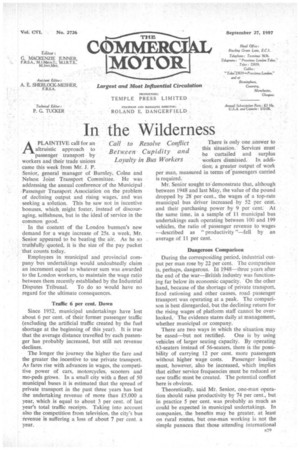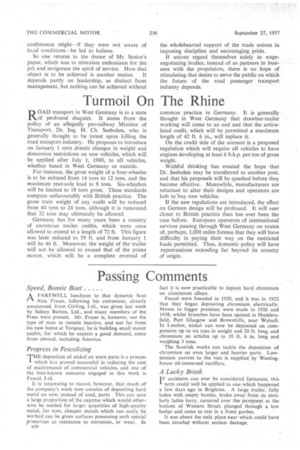In the Wilderness
Page 35

Page 36

If you've noticed an error in this article please click here to report it so we can fix it.
APLAINTIVE call for an altruistic approach to passenger transport by workers and their trade unions came this week from Mr. J. P. Senior, general manager of Burnley. Caine and Nelson Joint Transport Committee. He was addressing the annual conference of the Municipal -Passenger Transport Association on the problem of declining output and rising wages,and was seeking a solution. This he saw not in incentive bonuses, which, might foster, instead of discouraging, selfishness, but in the ideal of service in the common good.
In the context of the London busmen's new demand for a wage increase of 25s. a week, Mr. Senior appeared to be beating the air. As be so truthfully quoted, it is the size of the pay packet that counts today.
Employees in municipal and provincial company bus undertakings would undoubtedly claim an increment equal to whatever sum was awarded to the London workers, to maintain the wage ratio between them recently established by the Industrial Disputes Tribunal. To do so would have no regard for the ultimate consequences.
Traffic 6 per cent. DOWII Since 1952, municipal undertakings have lost about 6 per cent. of their former passenger traffic (exluding the artificial traffic created by the fuel shortage at the beginning, of this year). It is true that the average distance travelled by each passenger has probably increased, but still net revenue declines.
The longer the journey the higher the fare and the greater the incentive to use private transport. As fares rise with advances in wages, the competifive power of cars, motorcycles, scooters and mo-peds grOws. In a small city with a fleet of 50 municipal buses it is estimated that the spread of private transport in the past three years has lost the undertaking revenue of more than £5,000 a year, which is equal to about 3 per cent, of last year's total traffic receipts. Taking into account also the competition from television, the city's bus revenue is suffering a loss of about 7 per cent. a year. There is only one answer to this situation. Services must be curtailed and surplus workers dismissed. In addition; a greater output of work per man, measured in terms of passengers carried is required.
Mr. Senior sought to demonstrate that, although between 1948 and last May, the value of the pound dropped by 28 per cent., the wages of a top-rate municipal bus driver increased by 52 per cent. and their purchasing power by 9 per cent. At the same time, in a sample of 11 municipal bus undertakings each operating between 100 and 199 vehicles, the ratio of passenger revenue to wages —described as "productivity "—fell by an average of 11 per cent.
Dangerous Comparison
During the corresponding period, industrial output per man rose by 22 per cent. The comparison is, perhaps, dangerous. In 1948—three years after the end of the war—British industry was functioning far below its economic capacity. On the other hand, because of the shortage of private transport, food rationing and other causes, road passenger transport was operating at a peak. The comparison is best disregarded, but the declining return for the rising wages of platform staff cannot be overlooked. The evidence stares daily at management, whether municipal or company.
There are two ways in which the situation may be eased—but not rectified. One is by using vehicles of larger seating capacity. By operating 63-seaters instead of 56-seaters, there is the possibility of carrying 12 per cent. more passengers without higher wage costs. Passenger loading must, however, also be increased, which implies that either service frequencies must be reduced or new traffic must be created. The potential conflict here is obvious.
Theoretically, said Mr. Senior, one-man operation should raise productivity by 74 per cent., but in practice 5 per cent, was probably as much as could be expected in municipal undertakings. In companies, the benefits may be greater, at least on rural routes, but one-man working is not the simple panacea that those attending international conferences might—if they were not aware of local conditions—be led to believe.
So one returns to the theme of Mr. Senior's paper, which was to stimulate enthusiasm for the , job and invigorate the spirit of service. How that object is to be achieved is another matter. It depends partly on leadership, as distinct from management, but nothing can be achieved without the wholehearted support of the trade unions in imposing discipline and encouraging pride.
If unions regard themselves solely as wagenegotiating bodies, instead of. as partners in business with the proprietors, there is no hope of stimulating that desire to serve the public on which the future of the road passenger transport industry depends.












































































































